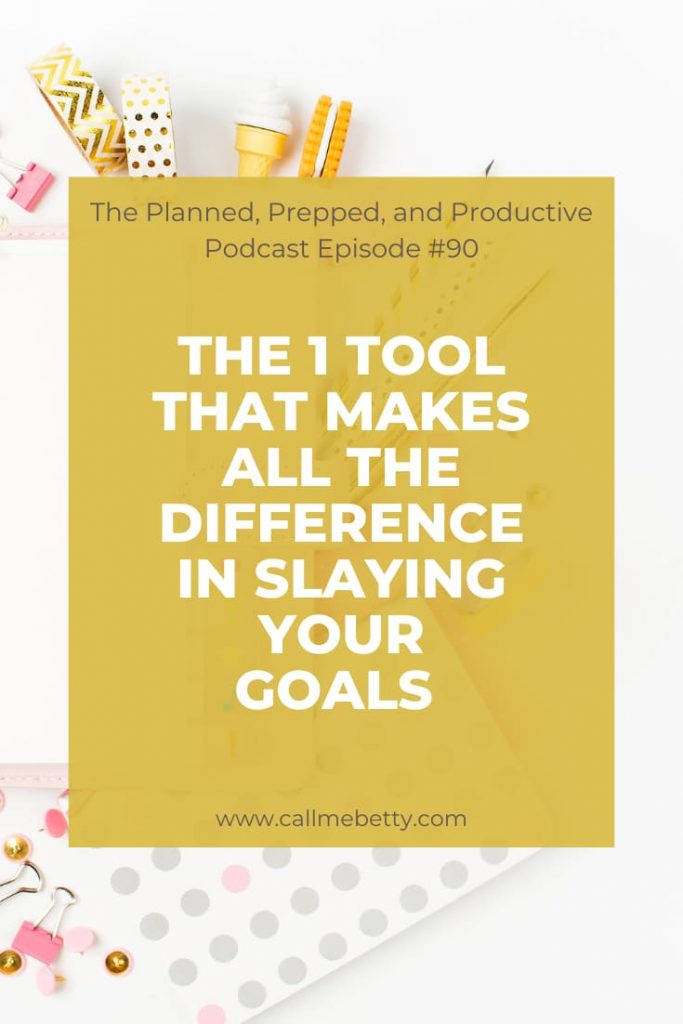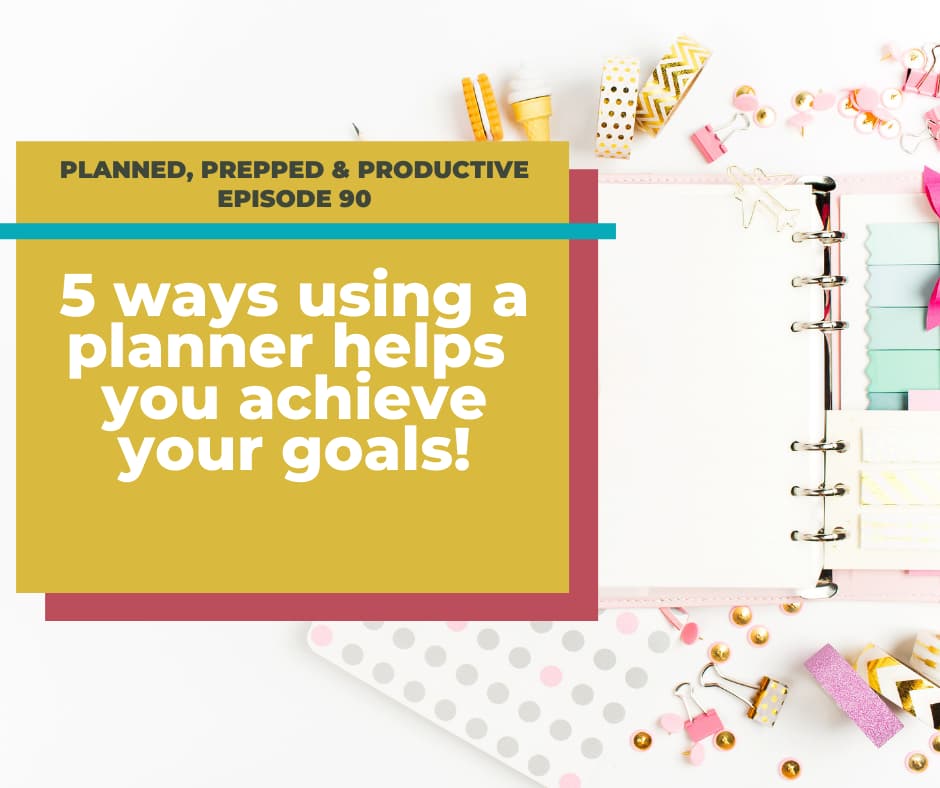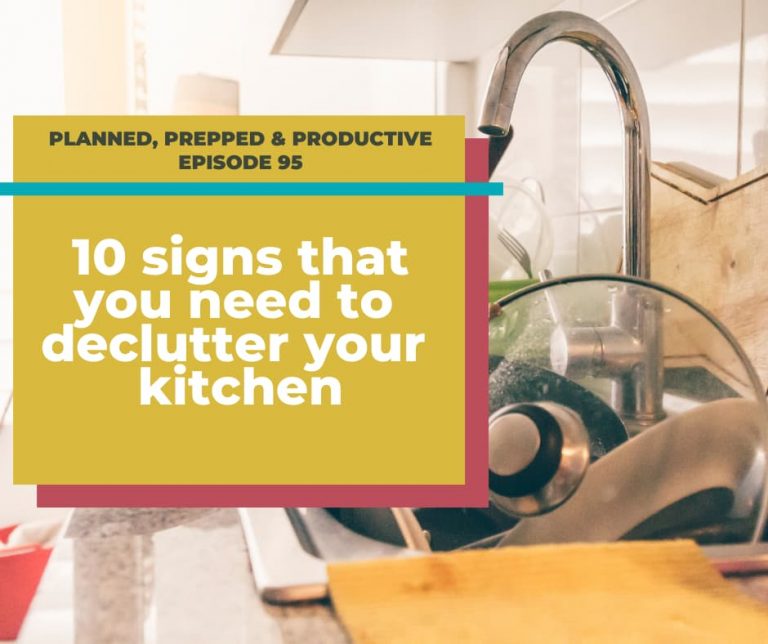Stop quitting on your goals using a planner
The key to accomplishing instead of quitting on your goals is using a planner or journal (or both) to keep you accountable! Read on for the 5 ways a planner makes all the difference

Why goals usually fail
It’s the new year, you’re hungover from the holidays, and you’re ready to stop celebrating and start slaying those goals.

So you write out all the goals, come up with a plan to accomplish them, and get to work.
…and by mid-february you’ve completely forgotten about them.
There are loads of reasons goals and new year’s resolutions fail. In fact, I’m honestly not a huge fan of new year’s resolutions at all. But I’m all about habits and their power to change (see my episode on keystone habits).
So rather than complain about how you should really be setting goals year-round and you don’t NEED to make new year’s resolutions, I’m going to show you how utilizing a planner daily can help those goals actually stick, help you make them easier and more digestible, and be the habit that changes your life.
Stop quitting on your goals using a planner
In fact, if you don’t already use a planner regularly I suggest ditching all of your other goals and instead make using a planner daily your goal. You’ll start to notice that you start to make progress torwards your other goals and aspirations without even really trying while you make your planner a habit, and then you’ll be super ready to slay any goal you have in mind once you’ve solidified the planner habit.
So to get started, let’s talk about how a planner can help you overcome many common goal problems.
How a planner helps you over come common goal problems
- It’s like a built-in accountability partner
- It allows you to track streaks
- It helps you use your goals to give your daily life direction
- It allows you to break down your goals into actionable steps
- It allows you to easily course-correct
My mom and sister are both working with a trainer in a fitness program right now. On Christmas Eve they grumbled as they dragged themselves away from the holiday festivities to squeeze in a HIIT workout.
Both of them complained that they didn’t want to, but they would rather do the workout then tell their trainer that they didn’t do the workout.
Now I’m not going to claim that a planner is quite that effective, but something about writing down a goal allows you to be your own accountability partner.
You might be thinking, but I always write down my goals and you’d probably be right. But when you do this in a planner you’re writing down goals over and over as a constant reminder to yourself, and your breaking them down into actionable bites. So if you’re goal is to exercise more frequently then your goal might be to exercise 3 times/week.
But instead of writing that once at the beginning of the year or forgetting it, you’ll write it each week.
Then you’ll break it down.
Which days are you going to exercise? What time? What specifically will you do? For how long? What roadblocks might you hit? How did you do last week? How will you do better this week? If it’s not going well how will you readjust.
For me, when I’ve written down that I will exercise at 9 AM, and I come up with a specific workout that’s already completely mapped out I’m more likely to do it.
Streaks
A planner can also be motivating because you can easily track streaks. Companies everywhere understand that our brains love streaks. Even my bank rewards me for logging in every day and there’s something so motivating about seeing that “streak” each time I log in reinforcing me to want to log in again tomorrow.
In your planner you can easily track your habits and see your progress which will continue to motivate you when things get more difficult.
Planners help your goals give your life direction instead of the other way around
Let’s keep going on this exercise example since it’s one of the biggest new year’s resolutions out there.
So let’s say you make a goal at the beginning of the year to exercise 3 days/week. Chances are you’ll get it done for the first two weeks or so, then you’ll miss a day or two until slowly you’re not doing it all.
Why does this happen?
Well, like I said there are a lot of reasons, but the biggest one for me is roadblocks.
One day my baby is sick, or he didn’t sleep well that night so I’m tired, or my muscles are sore, or I have somewhere to be after and I don’t have time to shower. Eventually the habit is completely forgotten about.
This is because I prioritized my day-to-day life over my goals.
If you are a mom then you know that you could easily let mom tasks completely overtake your life and you would never run out of things to do.
But if you plan goals first then you let your goals guide the direction of your life instead.
So with your planner you will know your goals are your first priority and you will work your life around the goals. You will never forget the goals because you’re writing them down and repeating them each week.
This leads me to the next problem a planner helps you overcome.
Planners let you break your goals down into actionable steps
I already brought this up when we talked about accountability, but the more specific your goal is the more likely you are to accomplish it. Also the more you are able to break it up into tiny steps and be reasonably consistent about accomplishing those tiny steps.
So a goal at the beginning of the year of run a half-marathon doesn’t mean much and will probably be broken. But a daily goal of running a mile will get you on the right track. Especially as you use the feedback from your planner to adjust your goals which is the last way a planner helps you to accomplish your goals.
Planners allow you to adjust and course-correct
Another one of the biggest problems with goal-setting is that as humans we tend to give up at thr first sign of failure.
But this all or nothing way of thinking is one of the biggest ways we lose progress on our goals.
So let’s say you’re doing all of the things we’ve talked about, you set a goal to exercise 3 times a week. You choose your days, times, exercises, and you’re still making excuses.
Instead of feeling like a failure and quitting, use this information as feedback and adjust accordingly using your planner.
So let’s say you still aren’t exercising. Why is it?
Is it because the baby is keeping you up at night? Can you get help with the baby to make exercise more realistic? Is it because you are consantly running late and have somewhere to be? Then can you adjust the time you exercise or drop anything out of your schedule to make it happen?
When you use your planner to evaluate your goal progress, and then use those evaluations to adjust your goals you fine-tune any problems you have until everything is working like a well-oiled machine. It’s quite magical really, and a mindset shift that will help you rock those goals.
So there you have it, the 5 ways a planner helps you stop quitting on your goals. It gives you a built-in accountability partner, allows you to use positive psychology by keeping track of streaks, helps you use your goals to guide your life instead of allowing life to get in the way of your goals, allows you to easily break goals down into bite-sized pieces, and gives you a place to reflect and course-correct.
If you want more specific advice for exactly HOW to use a planner you’ll want to stick around for the next episode of the podcast where I’m going to break down my system for yearly, monthly, weekly, and daily planning. You won’t want to miss it!
Until next time, happy planning!






